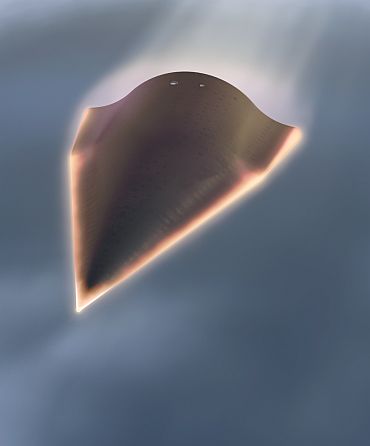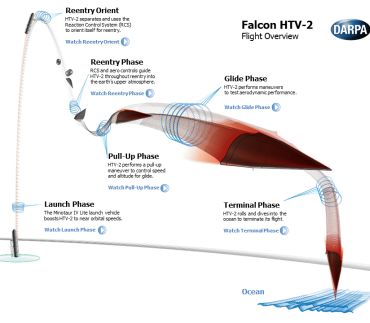The United States will on Thursday test flight an unmanned rocket launched aircraft capable of attaining top speeds of 21,580 kph as part of development of a new generation of hypersonic weapons that can strike faster than any missile.
The project nicknamed Falcon HTV-2 being developed by the Pentagon and the Defence Advanced Research Projects Agency has the capability to reach anywhere in the world in less than 60 minutes.
The hypersonic UAV will be launched on a rocket into space then will glide back down to Earth at speeds of 13,000mph (21,580 kph), the Daily Mail reported.
...
On TEST today: A weapon faster than any missile
The US military hopes that the success of the mission would give them strike capability to hit terrorists or rogue states anywhere in the world in short reaction time.
The rocket carrying the Falcon will take off on Thursday, weather permitting, from Vandenberg Air Force Base in California aboard an Air Force Minotaur IV rocket, which is a decommissioned ballistic missile, the report said.
The Falcon will then separate off and come back down at colossal speeds.
The hypersonic vehicles being developed, the daily quoted US officials as saying, would take less than 12 minutes to fly from New York to Los Angeles, a journey which takes a normal jet more than five hours, when configured into an aircraft.
The Falcon HTV-2, estimated to cost $308 million, has the potential of carrying a payload 1,000 lbs, including a nuclear bomb and the projects completion schedule is 2025.
On TEST today: A weapon faster than any missile
Image: HTV-2's planned second-flight mission profile"We gained valuable data from the first flight, made some adjustments based on the findings of an engineering review board to improve this second flight, and now we're ready to put all of that to the test," Dave Neyland, director of DARPA's Tactical Technology Office, said.
This mission, should it succeed, could set new records in sub-orbital space travel and pave the way for a generation of super weapons, he said.
Though the DARPA engineers have not disclosed which other countries are experimenting with the technology, it is believed that Indian defence scientists are also fairly advanced on hypersonic technology.




article